2024届高考英语一轮复习:非谓语动词 -ing form 课件 (共33张PPT)
文档属性
| 名称 | 2024届高考英语一轮复习:非谓语动词 -ing form 课件 (共33张PPT) |  | |
| 格式 | pptx | ||
| 文件大小 | 1.9MB | ||
| 资源类型 | 教案 | ||
| 版本资源 | 通用版 | ||
| 科目 | 英语 | ||
| 更新时间 | 2023-10-06 07:18:00 | ||
图片预览

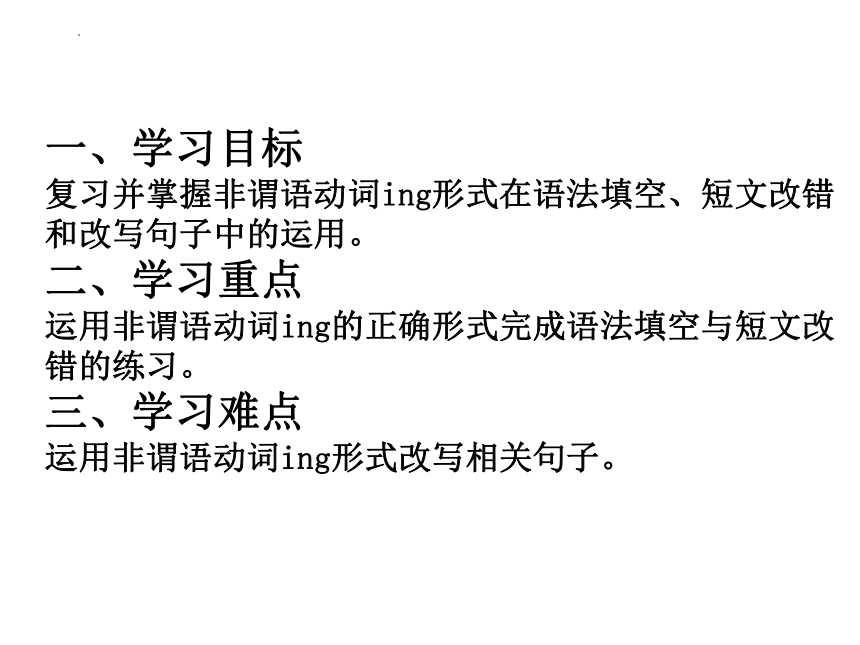

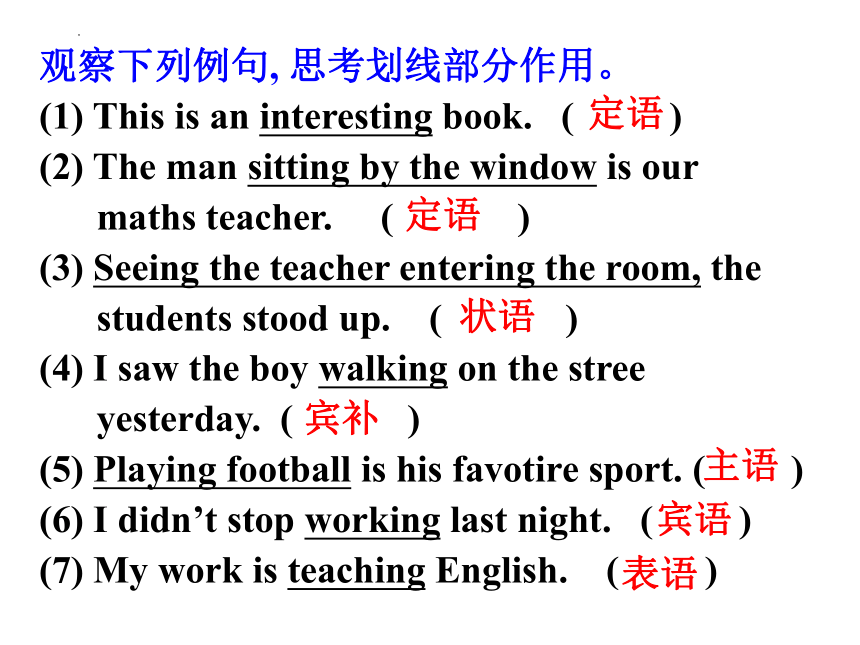
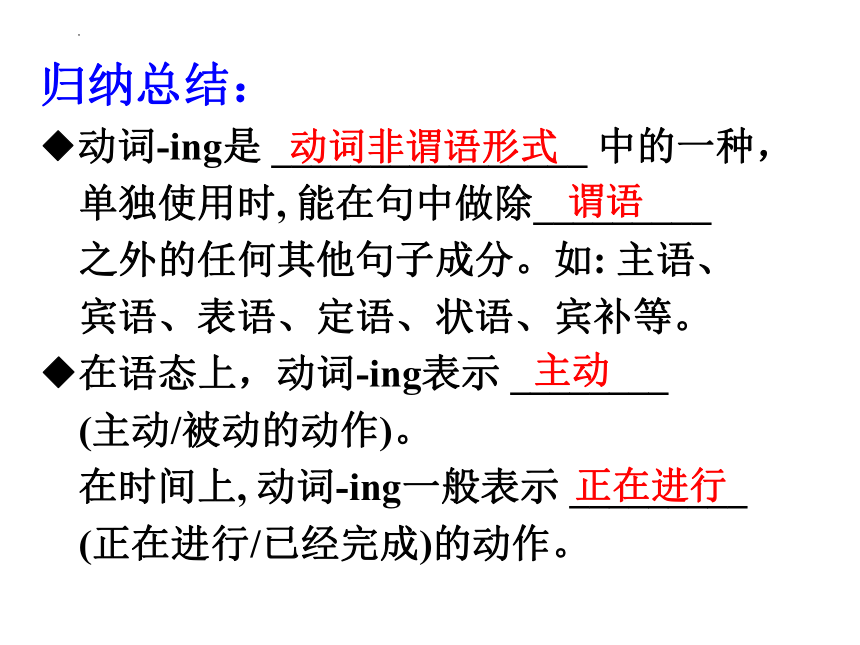

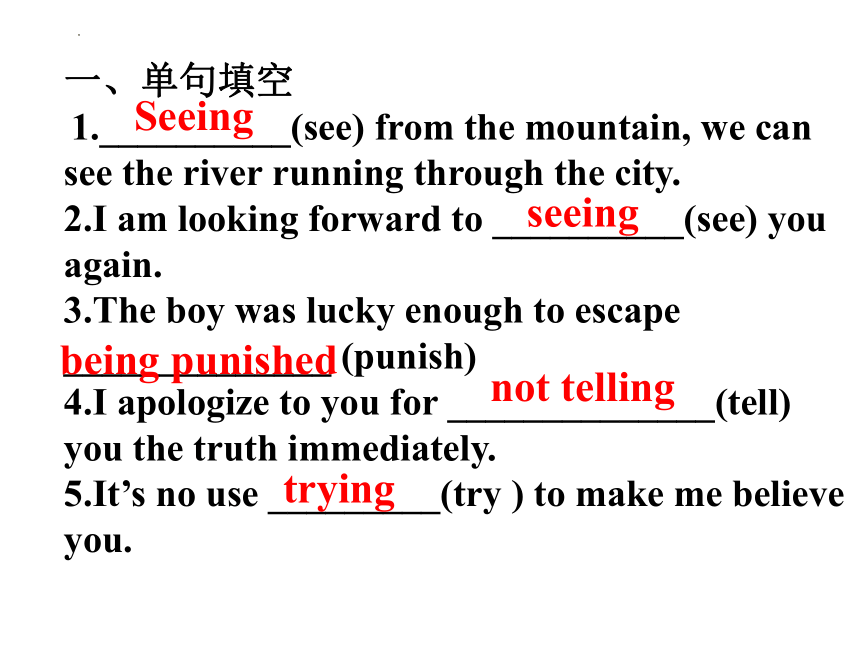

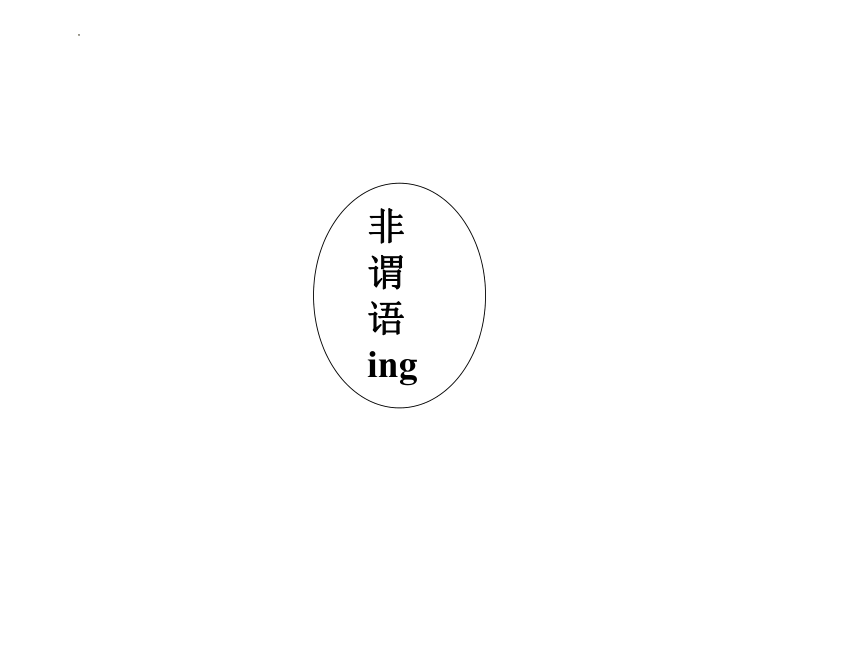

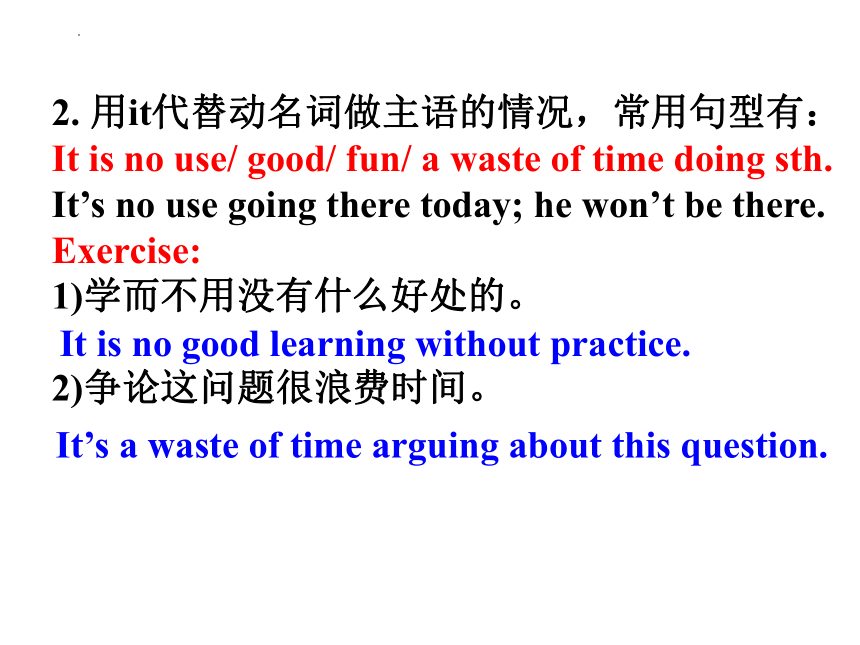
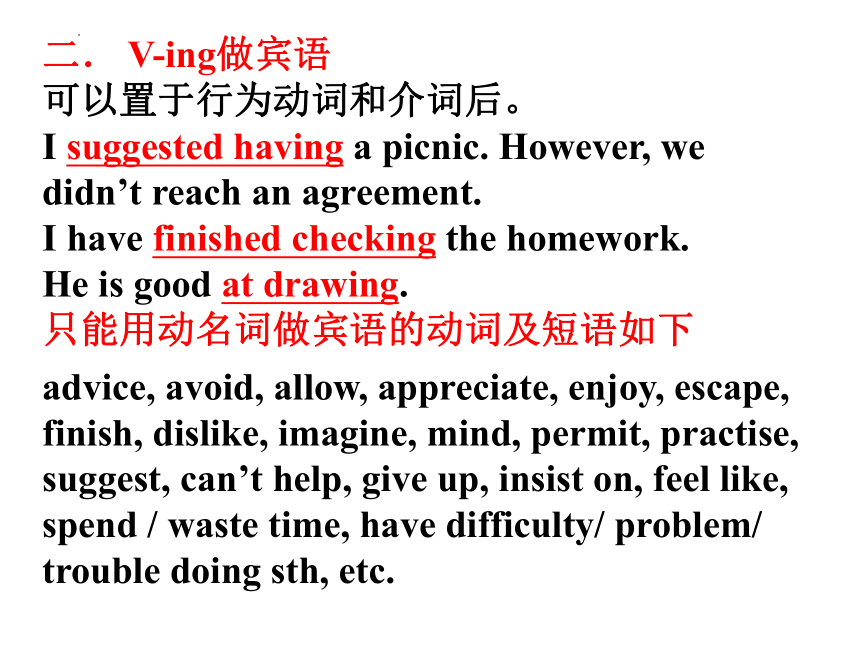
文档简介
(共33张PPT)
Revise The use of the –ing form
一、学习目标
复习并掌握非谓语动词ing形式在语法填空、短文改错和改写句子中的运用。
二、学习重点
运用非谓语动词ing的正确形式完成语法填空与短文改错的练习。
三、学习难点
运用非谓语动词ing形式改写相关句子。
【预学案】
观察下列例句, 思考划线部分作用。
(1) This is an interesting book. ( )
(2) The man sitting by the window is our
maths teacher. ( )
(3) Seeing the teacher entering the room, the
students stood up. ( )
(4) I saw the boy walking on the stree
yesterday. ( )
(5) Playing football is his favotire sport. ( )
(6) I didn’t stop working last night. ( )
(7) My work is teaching English. ( )
定语
定语
状语
宾补
主语
宾语
表语
归纳总结:
◆动词-ing是 ________________ 中的一种,
单独使用时, 能在句中做除_________
之外的任何其他句子成分。如: 主语、
宾语、表语、定语、状语、宾补等。
◆在语态上,动词-ing表示 ________
(主动/被动的动作)。
在时间上, 动词-ing一般表示 _________
(正在进行/已经完成)的动作。
动词非谓语形式
谓语
主动
正在进行
【课堂检测】
一、单句填空
1.__________(see) from the mountain, we can see the river running through the city.
2.I am looking forward to __________(see) you again.
3.The boy was lucky enough to escape ______________ (punish)
4.I apologize to you for ______________(tell) you the truth immediately.
5.It’s no use _________(try ) to make me believe you.
Seeing
seeing
being punished
not telling
trying
6.The girl __________(sit) under that tree is my sister.
7._________(lose) her new bicycle made Mary so upset.
8.________________( receive) a reply , he decided to write again.
9.I smell something _________(burn) tin the kitchen. Can I call you back in a minute
10.Tom’s _________(attend) the meeting made everyone there very happy.
sitting
Losing
Not having received
burning
attending
非
谓
语
ing
一.V-ing做主语
1.抽象、笼统的动作或泛指某动作行为。Eg.
Sleeping is a great pleasure.
Learning a foreign language is very useful for everyone.
Exercise:
1) 吸烟会致癌。
2) 散步是我喜爱的运动。
Smoking may cause cancer.
Taking a walk is my favorite sport.
2. 用it代替动名词做主语的情况,常用句型有:
It is no use/ good/ fun/ a waste of time doing sth.
It’s no use going there today; he won’t be there.
Exercise:
1)学而不用没有什么好处的。
2)争论这问题很浪费时间。
It is no good learning without practice.
It’s a waste of time arguing about this question.
二. V-ing做宾语
可以置于行为动词和介词后。
I suggested having a picnic. However, we didn’t reach an agreement.
I have finished checking the homework.
He is good at drawing.
只能用动名词做宾语的动词及短语如下
advice, avoid, allow, appreciate, enjoy, escape,
finish, dislike, imagine, mind, permit, practise,
suggest, can’t help, give up, insist on, feel like,
spend / waste time, have difficulty/ problem/
trouble doing sth, etc.
在介词后面做宾语:
devote to, look forward to, be fond of,
prevent from, be engaged in(忙于),
depend on, be/get/become used to等
Exercise:
1)我建议开始会议。
I suggest beginning the meeting.
2) 他承认钱是他拿的。
He admitted taking the money.
3) 我禁不住笑了起来。
I can’t help laughing.
三. -ing作定语
1)表示作用或功能, 也可以表示被修饰名词
的动作或状态
swimming pool
drinking water
a walking stick
a reading room
a writing desk
a surprising result
游泳池
饮用水
手杖
阅览室
写字台
一个惊人的结果
2)在意思上相当于一个定语从句
The rising sun(= the sun which is rising) shines on
my face.
The man standing there (= the man who is standing
there) is my brother.
Exercise:
The man who is standing there is Peter’s father.
=_______________________________________
站在那儿的那个人是彼得的父亲。
Anybody who swims in this river will be fined.
=_______________________________________
在这条河里游泳的任何一个人都会被罚款。
The man standing there is Peter’s father.
Anybody swimming in this river will be fined.
非
谓
语
ing
主
语
1.抽象、笼统、泛指
2. it 作形式主语
宾
语
1.只能用ing做宾语的动词及短语
2.在介词后面做宾语
定
语
1.表示作用或功能
2.在意思上相当于一个定语从句
suggest, can’t help, give up, insist on, feel like, spend / waste time, etc.
devote to, look forward to, be fond of, prevent from, be engaged in(忙于), depend on, etc.
It is no use/ good/ fun/ a waste of time doing sth.
四. 作宾补
1)感官动词如see, hear, watch, notice,
listen to, look at, smell, feel, find接现在分词作宾补,表示正在进行的主动意义。
I saw the dog digging holes in the yard.
She smelt something burning.
2)使役动词如have, get, set, keep, leave 接现在分词作宾补,强调动作的持续性
The boss has them working all day long.
Can you keep the clock going
His action set me wondering.
五.V-ing作表语
放在系动词之后, 用来泛指某种动作或行为, 以说明
主语的身份、性质或情况。
Her job is typing letter.
The main thing is getting there in time.
The world Cup is extremely exciting.
Exercise:
1)我们的工作是为人民服务。
2)使我们失望的是,这结果太令人吃惊了。
Our work is serving the people.
To our disappointment, the result was so shocking.
六.V-ing做状语
当主句的主语和从句的主语相同,并且从句的主语和谓语是主谓关系时,一般情况下可把这个状语从句改为现在分词形式. 相当于状语从句的省略,可表时间, 原因, 条件, 结果,方式, 让步, 伴随等.
(1)When I walked down the street, I met Sue.
= Walking down the street, I met Sue.
(2)After we climbed to the top of Eiffel Tower,
we saw a beautiful landscape.
= Climbing to the top of Eiffel Tower, we saw
a beautiful landscape.
时间
时间
(3)Because I was sick, I have to stay at home.
= .
(4)If all the living things live without air or water, they must die.
=____________________________________________________________
(5)Although he lives far from the school, he never comes to school late.
=______________________________________________________________
(6) Though he was so tired, he had to work on.
=_______________________________________
(7) I fell on the floor, and hurt my leg.
=_____________________________________
Living without air or water, all the living things must die.
Living far from the school, he never comes to school late.
Being so tired, he had to work on.
I fell on the floor, hurting my leg.
Being sick, I have to stay at home
原因
条件
让步
让步
伴随
(8) She was so angry that she tore the letter into pieces.
=________________________________________
(9) He struggled to his feet by using a stick.
=_______________________________________
(10) The teacher came in and carried a book.
=_______________________________________
She was so angry, tearing the letter into pieces.
He struggled to his feet, using a stick.
The teacher came in, carrying a book.
结果
方式
伴随
主动形式 被动形式 否定形式
一般式 doing being done not doing/not being done
完成式 Having done having been done not having done/
not having been done
七、V-ing的一般式、完成式与否定形式
a) 观察下列2个句子, 体会having done与doing的不同用法:
1) Having written the letter, John went to the post office.
2) Seeing the beautiful sight, the children felt excited.
总结:一般式表动作____________
完成式表动作____________
有先有后
同时发生
非
谓
语
ing
主
语
1.抽象、笼统、泛指
2. it 作形式主语
宾
语
1.只能用ing做宾语
的动词及短语
2.在介词后面做宾语
定语
1.表示作用或功能
2.在意思上相当于
一个定语从句
宾
补
1.感官动词接ing表示
正在进行的主动意义
2.使役动词接ing
强调动作的持续性
表语
泛指某种动作或行为,
以说明主语的身份、
性质或情况
状语
时间、原因、条件、
结果、方式、让步、
伴随
suggest, can’t help, give up,
insist on, feel like,
spend / waste time, etc.
devote to, look forward to,
be fond of, prevent from, be
engaged in(忙于), depend on,
etc.
see, hear, watch, notice,
smell, feel, find, etc.
have, get, set, keep, leave
It is no use/ good/ fun/ a
waste of time doing sth.
【课堂研讨】
请同学们用5分钟时间画一幅与本节课知识点有关的思维导图。
【当堂训练】
一、高考链接
1.(2022·新高考Ⅰ卷)________ (cover) an area about three times the size of Yellowstone National Park, the GPNP will be one of the first national parks in the country.
2.(2022·新高考Ⅱ卷)When he saw a young child hanging from a sixth-floor apartment balcony (阳台), Henry ran one hundred metres, jumped over a 1.2-metre fence, and held out his arms to catch the _______ (fall) child.
Covering
falling
二、用非谓语美化句子。
1.Because she has no friend in the country, she found it impossible to find a job.
, she found it impossible to find a job.
2.The teacher found students sleepy in the afternoon and did everything he could to arouse their interest.
, the teacher did everything he could to arouse their interest.
Having no friend in the country
Finding students sleepy in the afternoon
3.They are visitors who come from several countries.
They are visitors .
4.When he saw the old woman knocked down, the student went up to help her.
On ________________________________, the student went up to help her.
5.Because he didn't know how much longer he could last, Nicholas did the only thing he could--he huddled in his cave and slept.
, Nicholas did the only thing he could--he huddled in his cave and slept.
coming from severalcountries
seeing the old woman knocked down
Not knowing how much longer he could last
课堂小结
一、做全优课堂相关练习 P56—58
二、用非谓语结构美化下面这篇小作文。
Nowadays, some students often cheat in exams .It is popular among students who are lazy and don't work hard at their lessons. They cheat for they want to get higher marks so that they can be praised or even admired. Also, some students who work hard at their lessons will cheat in exams because they are afraid of failing in exams.
【课后拓展】
Revise The use of the –ing form
一、学习目标
复习并掌握非谓语动词ing形式在语法填空、短文改错和改写句子中的运用。
二、学习重点
运用非谓语动词ing的正确形式完成语法填空与短文改错的练习。
三、学习难点
运用非谓语动词ing形式改写相关句子。
【预学案】
观察下列例句, 思考划线部分作用。
(1) This is an interesting book. ( )
(2) The man sitting by the window is our
maths teacher. ( )
(3) Seeing the teacher entering the room, the
students stood up. ( )
(4) I saw the boy walking on the stree
yesterday. ( )
(5) Playing football is his favotire sport. ( )
(6) I didn’t stop working last night. ( )
(7) My work is teaching English. ( )
定语
定语
状语
宾补
主语
宾语
表语
归纳总结:
◆动词-ing是 ________________ 中的一种,
单独使用时, 能在句中做除_________
之外的任何其他句子成分。如: 主语、
宾语、表语、定语、状语、宾补等。
◆在语态上,动词-ing表示 ________
(主动/被动的动作)。
在时间上, 动词-ing一般表示 _________
(正在进行/已经完成)的动作。
动词非谓语形式
谓语
主动
正在进行
【课堂检测】
一、单句填空
1.__________(see) from the mountain, we can see the river running through the city.
2.I am looking forward to __________(see) you again.
3.The boy was lucky enough to escape ______________ (punish)
4.I apologize to you for ______________(tell) you the truth immediately.
5.It’s no use _________(try ) to make me believe you.
Seeing
seeing
being punished
not telling
trying
6.The girl __________(sit) under that tree is my sister.
7._________(lose) her new bicycle made Mary so upset.
8.________________( receive) a reply , he decided to write again.
9.I smell something _________(burn) tin the kitchen. Can I call you back in a minute
10.Tom’s _________(attend) the meeting made everyone there very happy.
sitting
Losing
Not having received
burning
attending
非
谓
语
ing
一.V-ing做主语
1.抽象、笼统的动作或泛指某动作行为。Eg.
Sleeping is a great pleasure.
Learning a foreign language is very useful for everyone.
Exercise:
1) 吸烟会致癌。
2) 散步是我喜爱的运动。
Smoking may cause cancer.
Taking a walk is my favorite sport.
2. 用it代替动名词做主语的情况,常用句型有:
It is no use/ good/ fun/ a waste of time doing sth.
It’s no use going there today; he won’t be there.
Exercise:
1)学而不用没有什么好处的。
2)争论这问题很浪费时间。
It is no good learning without practice.
It’s a waste of time arguing about this question.
二. V-ing做宾语
可以置于行为动词和介词后。
I suggested having a picnic. However, we didn’t reach an agreement.
I have finished checking the homework.
He is good at drawing.
只能用动名词做宾语的动词及短语如下
advice, avoid, allow, appreciate, enjoy, escape,
finish, dislike, imagine, mind, permit, practise,
suggest, can’t help, give up, insist on, feel like,
spend / waste time, have difficulty/ problem/
trouble doing sth, etc.
在介词后面做宾语:
devote to, look forward to, be fond of,
prevent from, be engaged in(忙于),
depend on, be/get/become used to等
Exercise:
1)我建议开始会议。
I suggest beginning the meeting.
2) 他承认钱是他拿的。
He admitted taking the money.
3) 我禁不住笑了起来。
I can’t help laughing.
三. -ing作定语
1)表示作用或功能, 也可以表示被修饰名词
的动作或状态
swimming pool
drinking water
a walking stick
a reading room
a writing desk
a surprising result
游泳池
饮用水
手杖
阅览室
写字台
一个惊人的结果
2)在意思上相当于一个定语从句
The rising sun(= the sun which is rising) shines on
my face.
The man standing there (= the man who is standing
there) is my brother.
Exercise:
The man who is standing there is Peter’s father.
=_______________________________________
站在那儿的那个人是彼得的父亲。
Anybody who swims in this river will be fined.
=_______________________________________
在这条河里游泳的任何一个人都会被罚款。
The man standing there is Peter’s father.
Anybody swimming in this river will be fined.
非
谓
语
ing
主
语
1.抽象、笼统、泛指
2. it 作形式主语
宾
语
1.只能用ing做宾语的动词及短语
2.在介词后面做宾语
定
语
1.表示作用或功能
2.在意思上相当于一个定语从句
suggest, can’t help, give up, insist on, feel like, spend / waste time, etc.
devote to, look forward to, be fond of, prevent from, be engaged in(忙于), depend on, etc.
It is no use/ good/ fun/ a waste of time doing sth.
四. 作宾补
1)感官动词如see, hear, watch, notice,
listen to, look at, smell, feel, find接现在分词作宾补,表示正在进行的主动意义。
I saw the dog digging holes in the yard.
She smelt something burning.
2)使役动词如have, get, set, keep, leave 接现在分词作宾补,强调动作的持续性
The boss has them working all day long.
Can you keep the clock going
His action set me wondering.
五.V-ing作表语
放在系动词之后, 用来泛指某种动作或行为, 以说明
主语的身份、性质或情况。
Her job is typing letter.
The main thing is getting there in time.
The world Cup is extremely exciting.
Exercise:
1)我们的工作是为人民服务。
2)使我们失望的是,这结果太令人吃惊了。
Our work is serving the people.
To our disappointment, the result was so shocking.
六.V-ing做状语
当主句的主语和从句的主语相同,并且从句的主语和谓语是主谓关系时,一般情况下可把这个状语从句改为现在分词形式. 相当于状语从句的省略,可表时间, 原因, 条件, 结果,方式, 让步, 伴随等.
(1)When I walked down the street, I met Sue.
= Walking down the street, I met Sue.
(2)After we climbed to the top of Eiffel Tower,
we saw a beautiful landscape.
= Climbing to the top of Eiffel Tower, we saw
a beautiful landscape.
时间
时间
(3)Because I was sick, I have to stay at home.
= .
(4)If all the living things live without air or water, they must die.
=____________________________________________________________
(5)Although he lives far from the school, he never comes to school late.
=______________________________________________________________
(6) Though he was so tired, he had to work on.
=_______________________________________
(7) I fell on the floor, and hurt my leg.
=_____________________________________
Living without air or water, all the living things must die.
Living far from the school, he never comes to school late.
Being so tired, he had to work on.
I fell on the floor, hurting my leg.
Being sick, I have to stay at home
原因
条件
让步
让步
伴随
(8) She was so angry that she tore the letter into pieces.
=________________________________________
(9) He struggled to his feet by using a stick.
=_______________________________________
(10) The teacher came in and carried a book.
=_______________________________________
She was so angry, tearing the letter into pieces.
He struggled to his feet, using a stick.
The teacher came in, carrying a book.
结果
方式
伴随
主动形式 被动形式 否定形式
一般式 doing being done not doing/not being done
完成式 Having done having been done not having done/
not having been done
七、V-ing的一般式、完成式与否定形式
a) 观察下列2个句子, 体会having done与doing的不同用法:
1) Having written the letter, John went to the post office.
2) Seeing the beautiful sight, the children felt excited.
总结:一般式表动作____________
完成式表动作____________
有先有后
同时发生
非
谓
语
ing
主
语
1.抽象、笼统、泛指
2. it 作形式主语
宾
语
1.只能用ing做宾语
的动词及短语
2.在介词后面做宾语
定语
1.表示作用或功能
2.在意思上相当于
一个定语从句
宾
补
1.感官动词接ing表示
正在进行的主动意义
2.使役动词接ing
强调动作的持续性
表语
泛指某种动作或行为,
以说明主语的身份、
性质或情况
状语
时间、原因、条件、
结果、方式、让步、
伴随
suggest, can’t help, give up,
insist on, feel like,
spend / waste time, etc.
devote to, look forward to,
be fond of, prevent from, be
engaged in(忙于), depend on,
etc.
see, hear, watch, notice,
smell, feel, find, etc.
have, get, set, keep, leave
It is no use/ good/ fun/ a
waste of time doing sth.
【课堂研讨】
请同学们用5分钟时间画一幅与本节课知识点有关的思维导图。
【当堂训练】
一、高考链接
1.(2022·新高考Ⅰ卷)________ (cover) an area about three times the size of Yellowstone National Park, the GPNP will be one of the first national parks in the country.
2.(2022·新高考Ⅱ卷)When he saw a young child hanging from a sixth-floor apartment balcony (阳台), Henry ran one hundred metres, jumped over a 1.2-metre fence, and held out his arms to catch the _______ (fall) child.
Covering
falling
二、用非谓语美化句子。
1.Because she has no friend in the country, she found it impossible to find a job.
, she found it impossible to find a job.
2.The teacher found students sleepy in the afternoon and did everything he could to arouse their interest.
, the teacher did everything he could to arouse their interest.
Having no friend in the country
Finding students sleepy in the afternoon
3.They are visitors who come from several countries.
They are visitors .
4.When he saw the old woman knocked down, the student went up to help her.
On ________________________________, the student went up to help her.
5.Because he didn't know how much longer he could last, Nicholas did the only thing he could--he huddled in his cave and slept.
, Nicholas did the only thing he could--he huddled in his cave and slept.
coming from severalcountries
seeing the old woman knocked down
Not knowing how much longer he could last
课堂小结
一、做全优课堂相关练习 P56—58
二、用非谓语结构美化下面这篇小作文。
Nowadays, some students often cheat in exams .It is popular among students who are lazy and don't work hard at their lessons. They cheat for they want to get higher marks so that they can be praised or even admired. Also, some students who work hard at their lessons will cheat in exams because they are afraid of failing in exams.
【课后拓展】
